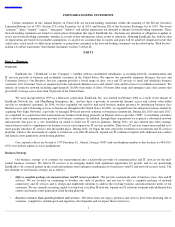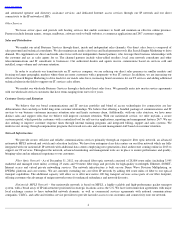Earthlink 2012 Annual Report Download - page 16
Download and view the complete annual report
Please find page 16 of the 2012 Earthlink annual report below. You can navigate through the pages in the report by either clicking on the pages listed below, or by using the keyword search tool below to find specific information within the annual report.
Table of Contents
revenues received from retail customers. Providers are permitted to pass through a specified percentage of their USF contribution assessment to
their customers in a manner consistent with FCC billing regulations. The FCC is considering a number of proposed changes to the method of
assessing these USF contributions, but we cannot predict when it may reach a decision or what types of changes may be adopted.
In December 2012, the FCC adopted an order clarifying its USF contribution rules that adversely affects companies like us that use
special access services purchased from incumbent carriers to provide broadband Internet access to our customers. The FCC stated that in these
cases, the incumbent carrier must pay a USF contribution on its special access revenues, which these carriers as a matter of course pass through
to the special access customer. This in turn increases our cost of purchasing special access service and using it as an input in providing
broadband Internet services. However, we must compete against broadband Internet access services provided by incumbent carriers and cable
television companies, among others, which are not subject to USF contribution requirements and therefore do not incur this added cost. Several
companies have petitioned for FCC reconsideration or judicial review of this decision, but we cannot predict whether these petitions will be
successful or when they may be decided.
In November 2011, the FCC adopted extensive revisions to its high-
cost support USF program, which largely subsidizes the provision
of local telephone service by incumbent carriers in rural areas. Under the new program, it should be difficult for incumbent carriers to receive
subsidies for services provided in competition with unsubsidized providers like us, although we cannot be certain that this will never occur. It is
also possible, under certain conditions, for competitive providers like us to seek subsidies for constructing and operating broadband Internet
access facilities in rural areas. However, we cannot predict whether provision of broadband services in such rural areas will be economically
practicable, even with potential subsidies.
Customer Proprietary Network Information and Privacy.
The Communications Act and the FCC's rules require carriers to implement
measures to prevent the unauthorized disclosure of Customer Proprietary Network Information, or CPNI. CPNI includes information related to
the quantity, technological configuration, type, destination and the amount of use of a communications service. CPNI rules include restrictions
on telecommunications carriers and providers of interconnected VoIP service. We must file a verified certification of compliance by March 1 of
each year that affirms the existence of training and other sales and marketing processes designed to prevent improper use and unauthorized
release of CPNI. An inadvertent violation of these and related CPNI requirements by us could subject our company to significant fines or other
regulatory penalties.
Additional measures to protect CPNI and consumer privacy are proposed from time to time, and both Congress and the FCC currently
are considering such additional measures. These developments appear to be part of a broader trend to protect consumer information as it
continues increasingly to be transmitted in electronic formats. We cannot predict whether additional requirements governing CPNI or other
consumer data will be enacted, or whether such additional requirements will affect our ability to market or provide our services to current and
future customers.
Network Management and Internet Neutrality.
In August 2005, the FCC adopted a policy statement that outlined four principles
intended to preserve and promote the open and interconnected nature of the public Internet, stating that consumers are entitled to access lawful
Internet content and to run applications and use services of their choice, subject to the needs of law enforcement and reasonable network
management. In an August 2008 decision, the FCC characterized these net neutrality principles as binding and enforceable and stated that
network operators have the burden to prove that their network management techniques are reasonable. In that order, which was overturned by a
court decision in April 2010, the FCC imposed sanctions on a broadband Internet access provider for managing its network by blocking or
degrading some Internet transmissions and applications in a way that the FCC found to be unreasonably discriminatory. In December 2010, the
FCC issued new rules to govern network management practices that, among other things, require public disclosure of network management
practices and prohibit unreasonable discrimination in the transmission of Internet traffic. These rules have taken effect but are currently being
challenged in court. It is not possible to determine what specific broadband network management techniques or related business arrangements
may be deemed reasonable or unreasonable in the future. We cannot predict how any future legislative, regulatory or judicial decisions relating
to net neutrality might affect our ability to manage our broadband network or develop new products or services.
11
























